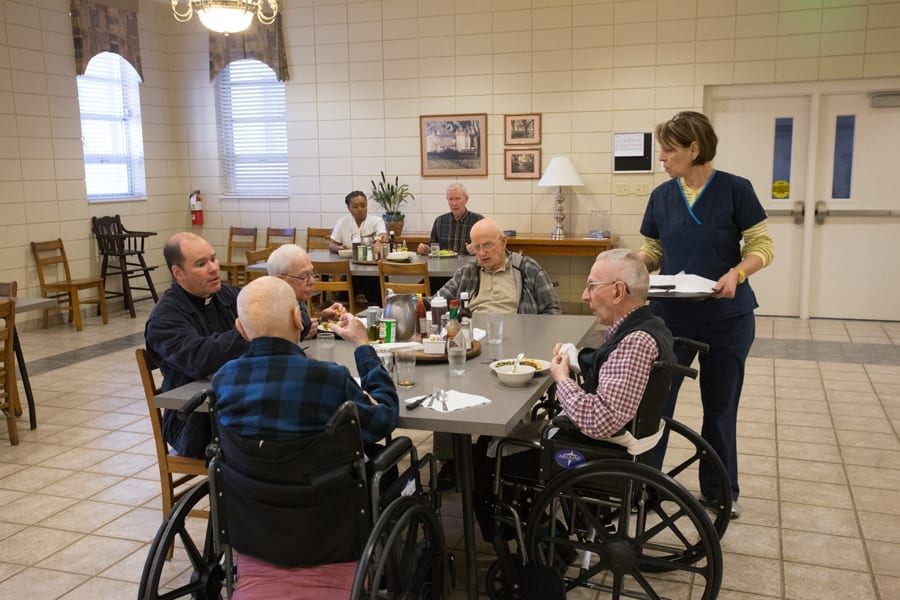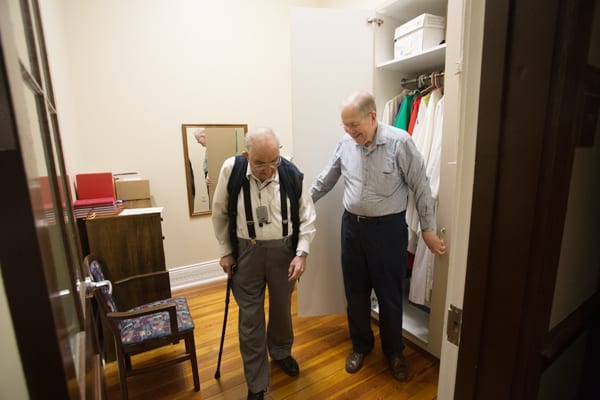Story and Photos by Thomas Rochford, SJ
Father Paul Schott, SJ, learned early on in his 97 years that much of life is out of our control. He was just starting sophomore year of college in New Orleans when the attack on Pearl Harbor dragged the U.S. into World War II.
He ended up in the Navy and was within days of taking part in the Normandy invasion when a mine disabled his landing craft and kept him from going. He saw God’s hand in his life then, and he still does now as he lives quietly in a community of older Jesuits after having had a long and successful career as high school president, pastor and administrator.
His first assignment after ordination in 1960 was Montserrat Retreat House in Lake Dallas, Texas. In 1965, he was named rector and president of Jesuit High in Dallas (now Jesuit College Prep).
“We had a brand-new school and no money to do anything,” he recalled.
The Jesuit who had set up the school charter established a foundation to support the school, and made the first contribution of $500.
Schott initiated an annual fund-raising event and alumni drive, which were innovations at the time. Donations increased a bit each year.

Then the provincial asked him to do the same thing at Jesuit High in New Orleans. Over the course of five years, Schott assembled a strong fund-raising effort, especially the alumni drive, which utilized a phone-a-thon. “Now those programs have developed so much,” he recalled proudly.
Schott held other leadership positions. He directed Manresa Retreat House in Convent, La., from 1979 to 1983. For seven years, he served as the executive assistant, or “socius” to two provincials. To his surprise, he served three parishes, St. Rita in Dallas and Holy Name of Jesus and Immaculate Conception in New Orleans, for years.
“When I entered the Society, I deliberately made the choice that I did not want to be a parish priest,” he said. “And I ended up in my career spending 25 years as a parish priest, which was a great experience. I’m convinced that’s where it really begins. If you want to touch all the crossroads of all the people, that’s where you’re going to meet them, in the parish. Birth to grave and all that happens in between. I enjoyed the parishes very much. I was very blessed. I enjoyed my career.
Schott moved in 2012 to St. Alphonsus Rodriguez Pavilion, a residence for senior or infirm Jesuits inside the campus of St. Charles College in Grand Coteau, La., after the school was renovated.
Schott said his health is relatively good.
“I still have my mind, thank goodness,” he said. “My internals are just perfect, but my externals are falling apart.”
He said his hearing and eyesight are diminished, and a brace supports one ankle. “The internals are most likely to put you away, so I put up with all this,” he said.
He finds Ignatian spirituality helps him cope with diminishing health.
“Goodness gracious,” he said. “We give everything to God. My prayer is constantly that. In fact, it’s the one thing that motivates me.”
He said he often recalls the words of Fr. Pedro Arrupe, the 28th superior general of the Society of Jesus, who was forced to resign after a debilitating stroke in 1981. “More than ever, I find myself in the hands of God,” Arrupe had said in a prayer that was read aloud at a meeting of his Jesuit brothers. “This is what I have wanted all my life from my youth. But now there is a difference; the initiative is entirely with God.”
Schott said God is making decisions for him, too.
“He’s given me this to bear, so that’s it,” he said. “The Society of Jesus taught us to always seek the will of God and do it. No question, this is God’s will for me at this time, and it’s a kind of blessing, but at the same time, it is not going to make it easy.
“I have come to be grateful. We call this a privileged time in our lives when you can look back and see all that God has done for you and realize that you still have something to do. Our mission is being sent to pray for the church and the society. Praying is not just formal prayer, but the biggest prayer is saying yes to God about the circumstances he has asked you to bear at this time.
“I have come to grow in what they call the ‘sacrament of the moment,’ here and now is all that matters. The past is gone, the future we don’t have any control over. So the only thing we can do is to say yes to God right now in everything.
“I think that’s Jesuit spirituality. That’s what we were taught to be as novices, what we try to live out in our active life, trying to do God’s will for his honor and glory. I have always been blessed in the sense that I have never lost my desire for prayer and my habit of prayer. Now I have more time for it, and I try to use more time for formal prayer.”

He is aware that aging takes a toll on every person. “Dementia is a very difficult thing,” he said. “I find that there are no relationships. I find a bit of loneliness that results because people can’t carry on a relationship.”
He said his own poor hearing limits his interactions. Before he got a hearing device that hangs around his neck, he could hear but not understand, and was isolated.
“That is one of the things that God is asking me to give up,” he said. “You know the “Suscipe” (the prayer St. Ignatius includes in the Spiritual Exercises) takes on a great deal of meaning in our life at this point. ‘Take, Lord, and receive all my liberty, my memory, my understanding . . . You have given all to me. To you, Lord, I return it.’”
Five of Schott’s seven siblings are still alive, and he has lots of nieces and nephews. He is grateful for the blessing of still having family.
He visited many nursing home residents when he was a pastor, and he learned from the older Jesuits who he used to nurse when he was a novice.
“I think the kind of people who impressed me did what I myself finally did,” he said. “They reached a point in life where they knew they had to give up independence and go where they could be cared for. When they got there, they were so adjusted. They didn’t complain.”
Ten years ago, he took a major step toward surrendering independence when he gave the keys to his car to his provincial. He also knew when it was time to move into assisted living.

“That’s why I say that I am blessed, I don’t know who taught me that.”
He often reflects on God’s role in his life and how it turned out.
He was a sophomore at Loyola New Orleans when life changed for everyone after the Pearl Harbor attack.
“For the first time, we had no choice to make,” he said. “The only choice was to enter this or that program to avoid the draft and finish college.”
Schott joined the Navy after graduation and went to Europe just before the Allies landed in Normandy.
He was in charge of a landing craft that was destined for the invasion. Two weeks before D-Day, the Germans dropped mines into the harbor where it was moored, and the next day, a ship bringing sailors to his landing craft hit the mines, prompting an explosion that blew up the engines.
“My (craft) was dead in the water, a week before I was supposed to load up and go to Normandy,” he said.
“God saved me. No telling what would have happened if I had gone to Normandy.”
Schott spent more time in England and France before being sent to the Pacific where he was supposed to take over an infantry landing craft as part of the invasion of Japan. A series of snafus kept him from connecting with his craft, which eventually was moored at the Bikini Atoll where the U.S. detonated nuclear devices. Schott returned to the States and spent 10 years working in his family’s meatpacking business. His annual retreats at Manresa House of Retreats helped him develop his spirituality. Eventually, he felt called to join the Society of Jesus.
Now he sees old age as a privileged time. “That doesn’t mean it is without pain and inconvenience. All sorts of things come with being 91.”
“I always prayed to do God’s will, but I never put it into context as much as I do now,” he said. “We are the mystical body . . . suffering with Christ, making up in our suffering what is lacking in the suffering of Christ. That notion gives meaning to anything that happens to me.
“It gives me purpose much more than before. Your purpose outside, when you are working, is to do what you are doing. Your purpose here is to give your prayer some significance, a focus. It has changed, but in a sense, it has only expanded in my understanding. I pray more and I pray regularly. I enjoy it, I must admit. I don’t just fall asleep like many do.
“My favorite prayers are like, ‘My soul is longing for the Lord; when shall I see him face to face?’ and ‘Thirsty is my soul, like the deer for running water.’ Those kind of things mean a lot to you.”
He said nearly every Jesuit in his community attends daily Mass, regardless of health issues.
“It is the one time that we really are one though it is expressed not in words but in presence and action, by attendance. For me, it means a lot.”

